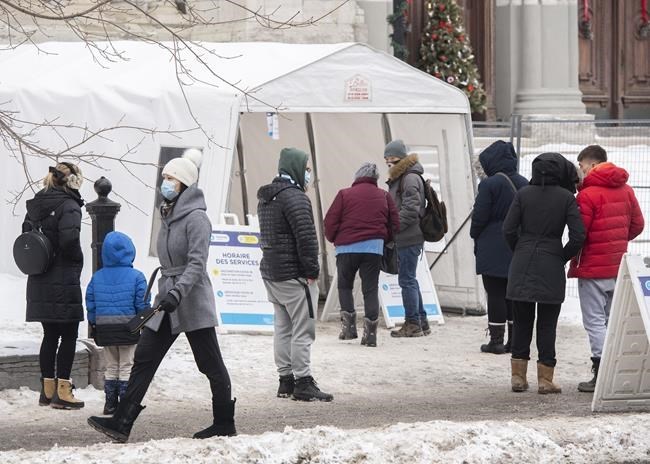Public sectors across the country are facing staff shortages as Canada continues to face record-breaking COVID-19 case numbers and hospitalizations related to the highly transmissible Omicron variant.
Quebec Health Minister Christian Dubé said Thursday that about 20,000 health-care workers were off because they had tested positive or been exposed to the virus. The government was working with unions to find more staff to care for roughly 2,500 COVID-19 patients, he added.
Health officials reported another 1,953 COVID-19 hospitalizations Thursday, a rise of almost 12 per cent compared with a day earlier. Officials said there were 207 patients in intensive care, an increase of 16.
Also in Quebec, four federal prisons were "very close" to experiencing staff shortages as more workers tested positive for COVID-19.
"We're very close to it but we're not there yet. And I hope we won't go there," said Mario Guilmette, Quebec region vice-president for the Union of Canadian Correctional Officers.
Guilmette said the Correctional Service of Canada was working on a protocol to be used if the province's federal prisons were short of staff. If the protocol is brought in, it means workers who are considered close contacts of someone who tested positive for COVID-19 could be asked to come back to work after isolating for eight days instead of 10.
Correctional Service spokeswoman Marie Pier Lecuyer said in a statement that the agency has not had to bring any staff who have tested positive back to work before they have fully recovered.
In the Atlantic region, New Brunswick's hospitals were struggling to provide appropriate and timely care amid rising COVID-19 infections and a high number of health staff who can't work because of the virus.
The province's health department said in a statement Thursday that hundreds of workers were isolating at home. Earlier this week, the government issued an official number of 571.
The New Brunswick Medical Society said the province's hospitals were already facing staffing shortages before the pandemic that impacted the ability of workers to provide sufficient care to patients.
In Ontario, outbreaks in long-term care homes were leading to staff absences of between 20 and 30 per cent in some areas.
Long-Term Care Minister Rod Phillips said there were outbreaks Thursday at 186 homes in 30 of Ontario's 34 public health units.
He said his ministry was in touch with homes struggling with staffing as the Omicron variant forced people into isolation.
"Staffing in long-term care remains a concern," Phillips said during a virtual news conference about a local jobs program. "It's an area that we're in daily contact with individual homes (about)."
The president of a union representing long-term care workers in the province spoke about desperate measures being taken to rally workers.
"Because Ontario failed to plan, more than 1,000 nursing home staff are off sick right now, causing nursing homes to desperately recruit from fast-food chains," said Sharleen Stewart, president of SEIU Healthcare.
Homes have asked fast-food workers to fill in for kitchen staff who can't work, she said.
Isolation due to surging cases of the Omicron variant was also putting pressure on some fire, transit and police services.
The City of Prince Rupert in northwestern B.C. said in a statement that eight of its 20 firefighters are off because of COVID-19. The city added the department is managing the shortages but if needed will rely on an agreement with the volunteer firefighting department in neighbouring Port Edward to help.
Winnipeg Transit was using spare operators and overtime to cover shifts, and the city said schedules for some routes would be decreased.
Mississauga, Ont., also temporarily suspended some services due to staff shortages. The city said reductions will be in effect until further notice.
The Winnipeg Police Service declared an internal state of emergency Wednesday due to staffing shortages while Edmonton and Calgary police services warned of staffing challenges.
A small First Nation in northern Ontario is down many essential workers as a COVID-19 outbreak has infected nearly half of its 400 residents. It has declared a state of emergency andrequestedmilitary assistance.
Nishnawbe Aski Nation Grand Chief Derek Fox said many of the essential workers in Bearskin Lake First Nation are sick with the virus or isolating in their homes.
Charles Fox, who is a member of the community, said water and sewage truck drivers are having to come to work when positive but are working alone.
"We need the army to come and provide the manpower for loading of freight, distribution supplies, hampers, and we need people to drive all the people to the swabbing centre," he said.
— With files from Erika Ibrahim in Ottawa, Kevin Bissett in Fredriction, Holly McKenzie-Sutter and Maan Alhmidi in Toronto
This report by The Canadian Press was first published Jan. 6, 2022.
___
This story was produced with the financial assistance of the Facebook and Canadian Press News Fellowship.
Brittany Hobson, The Canadian Press



